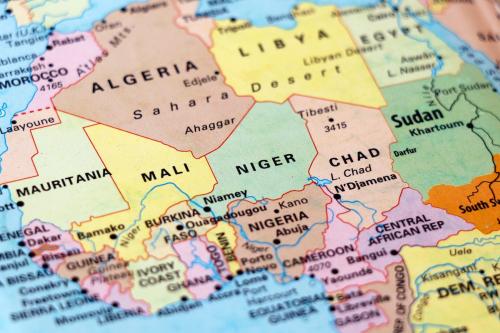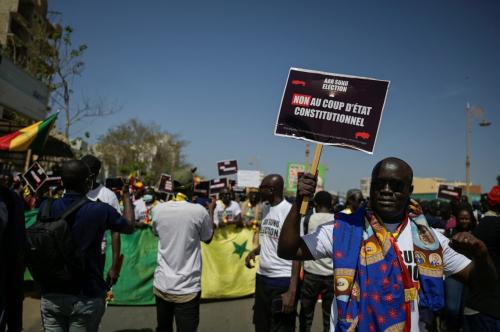This viewpoint is part of Foresight Africa 2024.
Africans desperately want to trust their governments. In return, African governments need to demonstrate that they can be trusted.
Following his ouster in a military coup d’etat, which brought the decades-long rule of the Bongo family in Gabon to an unceremonious end, former president Ali Bongo Ondimba urged his citizens to resist the junta and “make noise” to save their democracy. Not only was president Bongo’s call to stand up to the soldiers rebuffed, ordinary Gabonese took to the streets to welcome them and express relief at the termination of a democratic dispensation that was widely seen as having failed to live up to its billing. For Gabonese citizens, it was not so much that the army was welcome as that civilian rule had proved to be a huge anticlimax.
The situation in the West Central African country was far from unique. If the series of military interventions across the West African region over the past couple of years have a common feature, it is the revelation of an underlying popular frustration with democratic rule. Whereas scholars and policy analysts are wont to bemoan a pattern of democratic ‘backsliding’ or ‘recession,’ ordinary people insist that real democracy has been noticeable on account of its virtual absence. More significantly, they lament that governance in a majority of African countries has been reduced to a sweepstakes in which politicians and sundry office holders are the winners, while citizens who have seen none of the touted ‘dividends of democracy’ are the losers.
For this and associated reasons, African citizens are simultaneously distrustful and resentful of their governments, seeing in the embrace of the military by a section of the populace a serious indictment of self-serving leaders who continue to bleed governance of its moral content.
This trust can be easily regained if government officials hearkened to the wishes of their populace, especially frustrated and increasingly desperate young people, for greater accountability and judicious management of resources.
One thing that African governments must do as a matter of urgency is work towards changing the impression that political offices exist only for the acquisition of personal wealth. Part of the reason ordinary Gabonese refused to lift a finger in defense of their deposed president was that, for nearly six decades, the Bongos had turned the state into an extension of the family- and vice versa. It stands to reason that ordinary citizens would be disinclined to sacrifice themselves for a state that does not, properly speaking, belong to them.
Changing the impression that offices exist only for the acquisition of personal wealth must be complemented with an aggressive and deliberate pursuit of social welfare. Insofar as the primary reason that young Africans are voting with their feet and seeking to start new lives in other parts of the world is the poverty of physical infrastructure to support job creation across the region, African governments must invest heavily in such infrastructure (schools, hospitals, roads, bridges, electricity, etc.) as a strategy of retaining and nourishing the continent’s best brains.
Neither of these worthwhile goals can be achieved without a commitment to the rule of law, particularly the idea that both leaders and citizens are civic equals held to the same standards and expectations.
Africans desperately want to trust their governments. In return, African governments need to demonstrate that they can be trusted.
The Brookings Institution is committed to quality, independence, and impact.
We are supported by a diverse array of funders. In line with our values and policies, each Brookings publication represents the sole views of its author(s).








Commentary
How African governments can regain the trust of their citizens
August 8, 2024